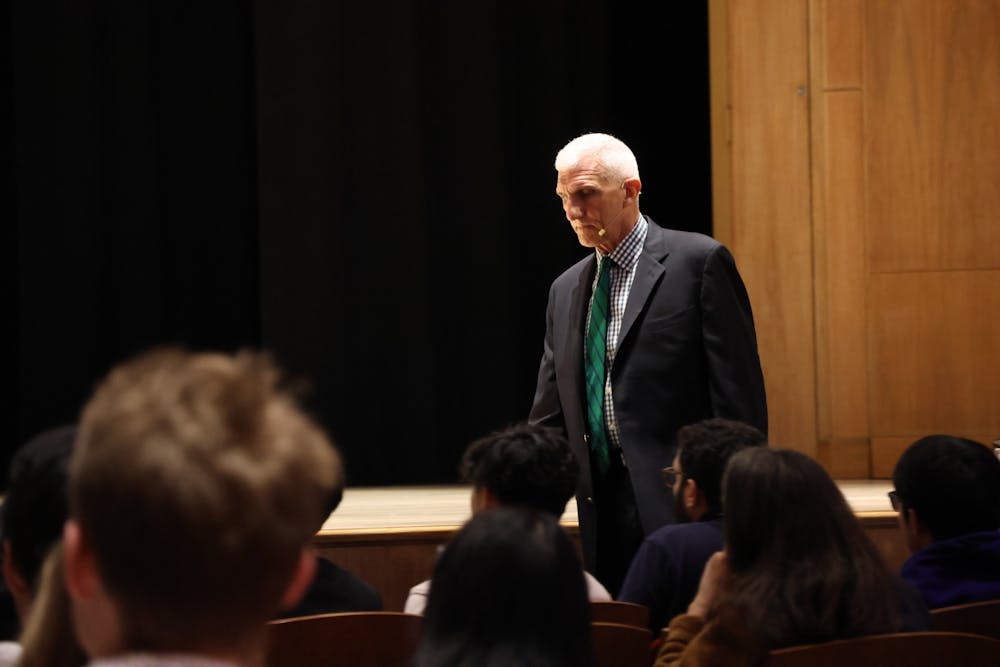The Foreign Affairs Symposium (FAS) and the International Studies Leadership Council (ISLC) cohosted retired U.S. Army Lieutenant General Mark Hertling for a lecture on Ukraine on Feb. 21. This was the second event in this year’s “Paradigm Shift” symposium series.
In an interview with The News-Letter, sophomore Nick Meeker, a member of ISLC’s events committee, emphasized the importance of bringing a unique military perspective to students at Hopkins.
“We were really trying to promote more knowledge on really sensitive and critical issues in the world,” he said. “[Hertling] can provide expertise on really complex situations in a way that is very informative for a lot of people.”
According to FAS Development Director sophomore Braden Flowers, the war on Ukraine is a pertinent concern and key to understanding current events. In an interview with The News-Letter, he discussed the importance of Hertling’s talk.
“[The war in Ukraine] helped shape the current world and the future world order,“ he said. “It's important that we as people in the U.S. are aware of what's going on and try to learn as much as we can.”
Throughout his 37-year career in the military, Hertling served as the commanding general of the U.S. Army Europe and the Seventh Army before retiring in 2013. He highlighted that his background in European military strategy gives him a unique perspective on the ongoing crisis.
Hertling began the FAS lecture by providing context on the physical geography of Ukraine and its significance to the war. According to him, Ukraine did not need an immediate offensive strategy because Russian tanks and artillery got stuck in Ukraine’s large and swampy terrain before reaching key boarder cities.
He also underscored key weaknesses in the Russian army, including faulty doctrine, poor troop-task ration and a small force size. He desribed his experiences touring the Russian camps in 2011 and talking with a Russian general.
“I went around and watched what [they were] doing and what his army was capable of doing, and to put it mildly, it was disappointing,” he said. “Very few officers and generals... [the Russian general] pulled me into a side with his interpreter, and he said to me, ‘How can I make my army more like your army?’ [I said] ‘I don't think you ever will because your soldiers don't have the capability.’ And he said to me, ‘I know.’”
Panagiotis Fafalios, a freshman studying Economics and Political Science, stressed the importance of hearing from Hertling in an interview with The News-Letter.
“It was interesting being able to talk to him about how past historical events have affected Ukraine and how it affects the future of the world,“ he said.
Hertling outlined the timeline of the war in Ukraine in five key stages. The earlier stages included Russian aggression and increased Ukrainian defenses, and the middle stage primarily consisted of Russian attempts at regeneration and a defensive stalemate.
The fifth stage, which is currently in progress according to Hertling, includes Ukraine preparing to take more offensive action while Russia reconfigures its original strategy.
“[Russia] recruited close to 60,000 criminals, taking them out of Russian jails and putting them on the front line saying hey, you can fight or you can stay in jail... And estimates by the U.S. government are that they have killed 40,000 or 60,000 prisoners,” he said.
Additionally, Hertling discussed the implications of the war on surrounding nations, including the region of Crimea, Belarus and North Atlantic Treaty Organization nations.
Belarus, in particular, is a complex situation. Though Belarus is in support of Ukraine, deploying its scarce troops to support the fight against Russia could leave the president’s palace open to a potential coup.
“When I was commander of the U.S. Army, we had a list of the 49 countries in Europe and listed them down by order of military capability,“ he said. “Belarus was number 48. When you're talking about Belarus, who has five brigades of about 30,000 soldiers, helping Russia is not an advantage.”
According to Hertling, one of the byproducts of the war includes a brain drain occurring in Russia, where the increased numbers of young men drafted into the war leave no capacity for innovation behind.
In an interview with The News-Letter, Mia Alemán, a junior studying International Studies and Museums and Society, touched on the connections between the content taught in class and shared through a professional.
“Sometimes talks can get a little boring if it's on an issue that happened because we already learned about that in class,“ she said. “Having someone come and talk about what's actually on the news is really helpful.”
Although Russia is facing many losses in the war, the nation is learning from its mistakes. However, Hertling is confident that Ukraine will come out victorious.
“Ukraine has a history of dance, music, culture, architecture and beauty. All the things that advanced civilizations have,” he said. “Unfortunately over the last 11 plus months, that has all been destroyed... under a scorched Earth campaign. A lot of people are suggesting that President Biden should say we should support Ukraine winning. The problem is no one really knows how to win.”





